If you experience itchy skin all over your body, the cause may be a parasitic infection, fungus, or some other disease. Most cases of such manifestations are associated with a skin reaction to allergens. Such manifestations are quickly eliminated if the provoking factor is identified and removed. Itching sensations due to diseases are much more difficult to remove.
What is itchy skin
Human skin is penetrated by billions of nerve endings, which are very sensitive to all sorts of irritants: vibration, touch, chemical or thermal effects. A crawling insect, an insect bite, the touch of a feather, a cobweb, or a hair can cause a desire to itch, burning, tingling at the site of irritation: you want to quickly remove this unpleasant sensation by scratching the itchy skin.
Generalized itching - unbearable discomfort in the superficial layers of the dermis - can cause some diseases of the internal organs, allergic reactions due to dermatitis. Among the symptoms of dermatological diseases, skin itching dominates, but scratching syndrome of the anogenital zone, conjunctiva, trachea, pharynx, nose, and oral mucosa often occurs. There is a distinction between itching of the whole body without rash and with rash.
Body itching without rash
Itching all over the body without rashes can occur due to the following diseases:
- Kidney: chronic failure.
- Liver, gallbladder, pancreas: cancer of the head of the pancreas, biliary cirrhosis, hepatitis, bile stagnation, obstruction of a large bile duct, increased bile salts in the blood, sclerosing cholangitis, obstruction of the duodenal papilla by a neoplasm or stone.
- Neuroendocrine: hypo- and hyperthyroidism, hyperparathyroidism, carcinoid syndrome, diabetes mellitus, symmetrical erythrocyanosis.
- Hematological (blood diseases): leukemia, paraproteinemia, mastocytosis, lymphogranulomatosis, iron deficiency anemia, polycythemia vera, lymphomas, multiple myeloma, Waldenström's macroglobulinemia.
- Neurological: brain tumor, multiple sclerosis, brain abscess, cerebral infarction.
- Paraneoplastic syndrome: visceral carcinoma, Sjogren's disease.
- Rheumatological: dermatomyositis.
- Mental: depressive states and psychoses.
- Infectious and parasitic: parasitosis, HIV.
- Other conditions: age-related changes (senile), pregnancy, alcoholism and hangover.
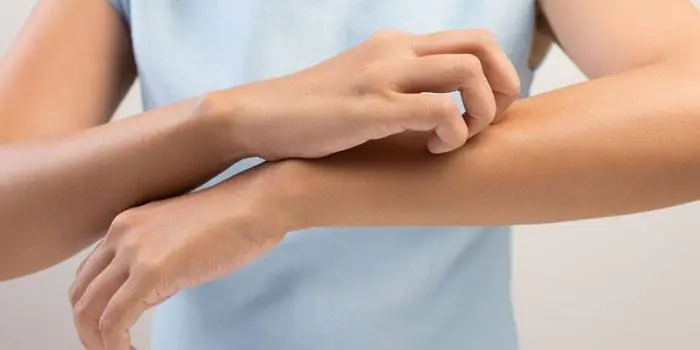
Rash and itching on the body
When multiple changes occur on the mucous membrane and skin that differ in color, texture, and appearance from normal skin, they indicate a rash. The rash can affect the arms, legs, face, stomach, and chest. These may be primary symptoms - pustules, redness, spots, goosebumps, blisters, pimples, blisters. As the disease progresses, the rash is replaced by secondary elements:
- Loss of natural skin color (discoloration, darkening).
- Erosions and ulcers are the result of opening an abscess with a violation of the integrity of the skin with the capture of subcutaneous fatty tissue.
- Peeling - scales of dead epidermis.
- Crusts are the dried surface of weeping erosion, ulcers, and opened blisters.
- Scratching – superficial or deep abrasions.
- Lichenification – thickening, strengthening of the skin pattern.
It is not worth making a diagnosis on your own, guided by visible signs and information you have read. In case of any suspicious manifestations, you should consult a doctor to identify the underlying internal pathology that caused the scratching. A rash and a strong desire to scratch on the body are accompanied by diseases such as:
- chicken pox;
- postherpetic neuralgia;
- rubella;
- measles;
- scarlet fever;
- herpes;
- meningococcal sepsis;
- hives;
- acne;
- fungal infections;
- psoriasis;
- scabies due to infection by microscopic parasites.
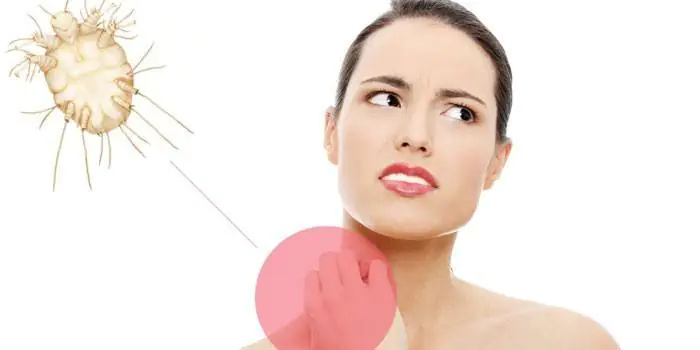
Why does my whole body itch?
When the body itches in different places, it is necessary, first of all, to determine the cause of this condition. Perhaps this is a consequence of fungal, allergic, inflammatory skin diseases, pathologies of internal organs, mental disorders and neuropathic diseases. Since there are so many causes, it is important to conduct a thorough diagnosis of the body to determine the root cause.
Allergy
Allergies in the 21st century have become the scourge of humanity. The entire population of the planet suffers from this disease to one degree or another. Allergies manifest themselves in the form of swelling, rashes, scratching, which vary in severity - from light scratching to scratching with the appearance of blood. With allergies and dermatitis, a large amount of histamine accumulates in the skin - a substance that causes scabies, tissue swelling, and dilates blood vessels. Therefore, itchy areas on the skin appear swollen and red.
Allergic itching is eliminated with antihistamines, but then the allergen should be identified and eliminated. A more serious neuroallergic disease is neurodermatitis or atopic dermatitis, which is characterized by uncontrollable, unbearable localized itching. This disease develops from childhood and subsides a little during puberty, but later recurs again. Treatment of diffuse neurodermatitis is long and complex.
Stress
A common cause of itching throughout the body is the development of psychogenic conditions: mental trauma, overstrain of the nervous system, stress, when a person does not control hand movements and constantly scratches and rubs the skin. At the same time, the desire to scratch under stress does not weaken, but, on the contrary, can only intensify. Often, against the background of neuroses, periodic wandering itching occurs, when it is impossible to determine a specific place. It is possible to avoid attacks or reduce their intensity if you eliminate the factors that cause stress.
Seasonal itching
Patients who complain of exacerbation of scabies attacks in spring or autumn can be confidently diagnosed with VSD (vegetative-vascular dystonia). This is due to a lack of vitamins in the body. Vitamin therapy, which should be prescribed by the attending physician, will help eliminate the symptoms. If your whole body itches in winter, you should go to the doctor and find out the reasons for this condition.
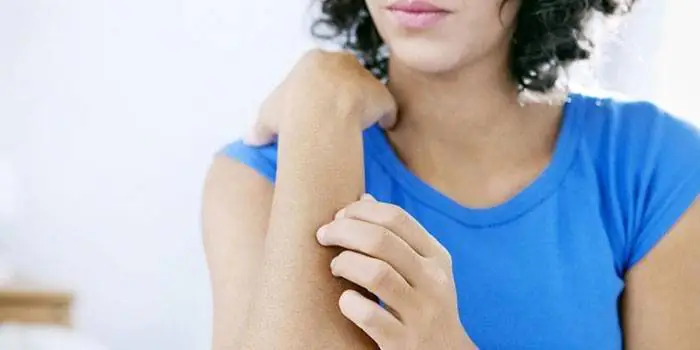
What diseases cause the body to itch?
Itching throughout the body can occur in various diseases, with different symptoms:
- Diffuse neurodermatitis. Symptoms: severely itchy areas of the skin, roughness, dryness and roughness of the skin at the affected area.
- Atopic dermatitis. Symptoms: redness, desire to itch with the formation of wounds and crusts. The face, neck, legs and arms, and abdomen are affected. It happens due to food allergies and dysbacteriosis.
- Contact dermatitis. Symptoms: local itching, redness, blisters, which eventually open and are replaced by ulcers. Locations: hands. Causes of appearance: allergens, dyes, medications.
- Hives. Symptoms: redness, swelling in strictly localized areas of the skin. In more severe cases, signs may include angioedema and anaphylactic shock. As a rule, itching with urticaria occurs on the abdomen, large joints, and the outer side of the palm.
- Fungal infection. Symptoms: the body itches, hair falls out with ringworm, suppuration of the skin with scab, peeling with fungal infection of the feet, redness in the folds of the skin and in the groin.
- Pediculosis (lice). Symptoms: itchy scalp, presence of nits (lice larvae), small bloody crusts, signs of bites on the neck.
- Scabies. Symptoms: scabies itches between the fingers, on the wrists, on the stomach, in the groin and gets worse at night. Characterized by localized symptoms with distribution throughout the body.
- Pruritoceptive. The cause is insect bites (mosquitoes, mosquitoes, wasps, hornets, ticks, bedbugs, fleas, bees, spiders). Symptoms: redness, swelling, strong desire to scratch at the site of the bite.
- Psoriasis. Symptoms: inflamed, reddened lesions with white scales of varying sizes. Areas beyond the psoriatic plaques may itch. The disease is chronic and difficult to treat.
- Anal. Symptoms: unbearable desire to scratch the itchy area. The desire to scratch may not be associated with any disease and can be explained by poor hygiene, but it can be a consequence of certain diseases: parasites (pinworms), erythrasma, hemorrhoids, thrombosis of the hemorrhoid, proctitis, diabetes.
- Genital. Symptoms: in women – the mucous membrane of the labia and vagina itch; in men - the scrotum and head of the penis. Causes: candidiasis, chlamydia, ureaplasmosis, trichomoniasis, gonorrhea, mycoplasmosis, bacterial vaginosis, colpitis, vulvar kraurosis (vulvar atrophy), in men - balanoposthitis (inflammation of the foreskin and head of the penis).
- Scalp. Causes: seborrhea, pediculosis, lichen. As a rule, it develops with dry skin.
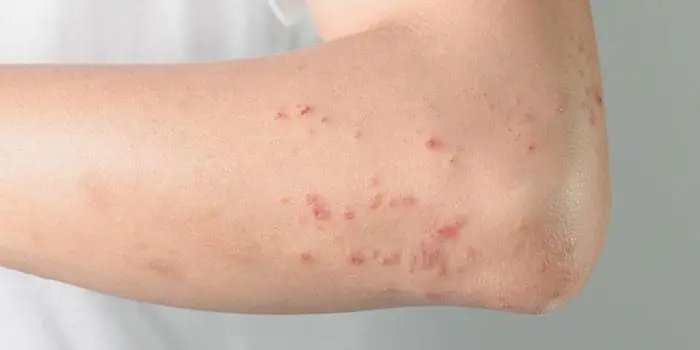
Types of skin itching
There is the following classification according to the frequency of relapses and intensity of manifestation:
- Spicy. It is a consequence of pathology in the body.
- Local. It has biological causes - bedbugs, ticks, etc. and is felt in a certain place.
- Generalized. Unpleasant manifestations throughout the body for various reasons. Can be observed in liver, endocrine, dermatological, hematological, neurogenic diseases, oncology.
- Chronic. It occurs for no apparent reason and indicates dermatosis and systemic diseases during an exacerbation.
What to do if your whole body itches
Considering that there is only one itching, but there are many causes, its treatment must be approached differently. What to do if your whole body itches? You can use ointments and creams that can relieve discomfort, but if the causes lie in liver disease or endocrine system disorders, then self-medication with local remedies can only aggravate the problem and complicate further treatment. Indeed, in this case, itching on the skin is just the tip of the iceberg, under which lies a serious illness, possibly fraught with tragic consequences.
Diagnostics
Determining the root cause will require diagnosing the itchy areas. First contact a dermatologist to prescribe tests and a detailed examination. If the dermatologist finds it difficult to name the cause, consultation with a therapist, endocrinologist, allergist, gastroenterologist and other specialists will be required. Principles of treating itchy skin:
- eliminating the cause;
- local treatment;
- systemic treatment.
Drug treatment
Depending on the reasons that caused the unpleasant symptoms, treatment for itching of the body skin is prescribed. For allergic scratching, antihistamines are prescribed: Zyrtec, Loratidine, Erius, Zyrtec, Suprastin, Tavegil. Additionally, it is recommended to take sedatives: Novo-Passit, valerian, mint tea, motherwort tincture, since the constant desire to itch disrupts sleep and makes the patient irritable. Complex manifestations are treated only under the supervision of a doctor.
However, this will take some time, and you want to relieve the itching as quickly as possible. Therefore, there are general recommendations:
- The diet should not contain salty, hot, spicy foods. It is undesirable to drink strong tea, coffee, and alcohol.
- If an elderly person has body itching (senile, worse in the evening and at night), then iodine preparations will alleviate the condition.
- Take warm baths with sea salt.
- Wipe the skin with calendula tincture in alcohol, lubricate with menthol-based antihistamine ointments.

Folk remedies
Along with drug therapy, folk remedies for body itching are used:
- A quick effect is achieved by taking baths with decoctions of plants: nettle, chamomile, mint, celandine, pine needles.
- Pruritoceptive (insect bites) are removed with coconut oil baths. To do this, dissolve 50 g of oil in a water bath and pour into warm water. The procedure time is 15 minutes.
- Lemon juice works great for itching, but it should not be applied to areas with damaged skin.
- Vaseline will help quickly relieve itching, as it will additionally moisturize and soften.
- To soothe irritations, you should use basil. It contains vitamins A, C, P, which are very important for skin health. You need to wipe the irritated areas with a clean fresh leaf or prepare a decoction of basil and make lotions.
- Apple cider vinegar and celandine are used as applications (do not use celandine for chemical or sunburn).
How to treat body itching
If a diagnosis is made, the disease that became the cause is determined, the appropriate medicine is prescribed for itching of the body skin:
- For renal itching: UVB therapy, Cholestyramine, activated carbon, Thalidomide, Naltrexone, Ondansetron, Capsacin cream, Tavegil.
- Itching due to cholestasis is treated with ursodeoxycholic acid, Cholestyramine, Phenobarbital, Rifampicin, Naloxone, Naltrexone, Nalmefene, Fexadine, Trexyl, Tavegil.
- Endocrine diseases: skin moisturizing, hormonal medications, compensation for diabetes mellitus are necessary.
- Hematological diseases: iron supplements, Aspirin, Cholestyramine, Cimetidine.
- Senile (senile): drugs with a calming effect (sedatives).
Local treatment
Local treatment includes treatment of the skin surface in areas of inflammation. These can be compresses, lotions of 3-5% vinegar, talcum powder, morning and evening hygiene. Among the medications, ointment is effective:
- Lokoid;
- Triderm;
- Ultraproct;
- Belosalik;
- Baneocin;
- hydrocortisone ointment (has a lot of contraindications).
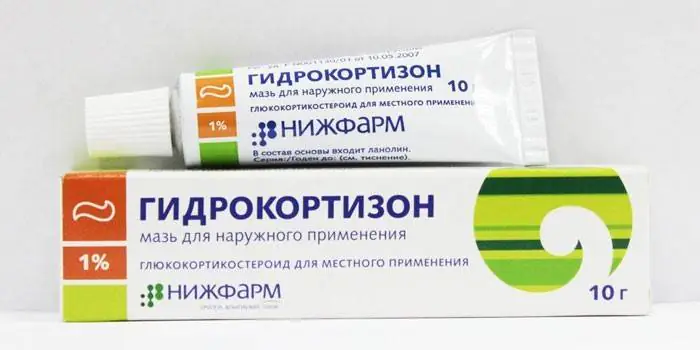
Antihistamines
In the treatment of diseases with manifestations of itching, drugs that block the production of histamine are often used. Antihistamines:
- Atarax. The active ingredient is hydroxyzine hydrochloride.
- Berlicourt. Prescribed to eliminate any signs of allergies. The active ingredient is triamcinolone.
- Desazon. The active ingredient is dexamethasone.
- Diazolin. Prescribed for psoriasis, eczema, urticaria, insect bites.
Etiotropic therapy
This is a treatment aimed at eliminating a microbial, viral, bacterial, infectious pathogen. All antibacterial drugs (antibiotics), sulfonamides, nitrofuran drugs are etiotropic. Etiotropic agents include interferons, antidotes, immune globulins, probiotics, bacteriophages, and anthelmintic drugs. Etiotropic therapy drugs are used for complications of hereditary diseases, poisoning, and herpetic infections of various organs.
How to remove body itching at home
Treatment at home is aimed at eliminating the symptoms, but you need to work with your doctor to combat the cause of the strong desire to scratch the skin. As temporary help you can use:
- Burdock roots. You need already dried roots to then obtain the powder using a coffee grinder. Pour 2 tbsp into a saucepan. l. powder, pour 1 liter of water. Cook for half an hour. When it cools down, you can make gauze compresses by applying to the irritated area. The effect should occur within half an hour.
- Alcohol tincture of elecampane. You can prepare it at home, for which you take 1 tbsp. l. finely chopped roots, pour them into a suitable dark glass bottle, add 50 ml of alcohol. The tincture is prepared for 10 days, after which you need to make an aqueous solution with the tincture and wipe the itchy skin. According to people's reviews, the effect occurs immediately.
- Needles. You will need young buds and pine needles in the amount of one glass. Pour a liter of boiling water over them and simmer over low heat for 20 minutes. Wash with the cooled broth, wipe the skin, make compresses and lotions. The result is felt quickly.
Human skin reacts quickly to various irritants. Bad weather conditions, chemicals and other substances often cause itching and redness. This irritation can be eliminated in various ways, which are selected by doctors individually depending on the causes.
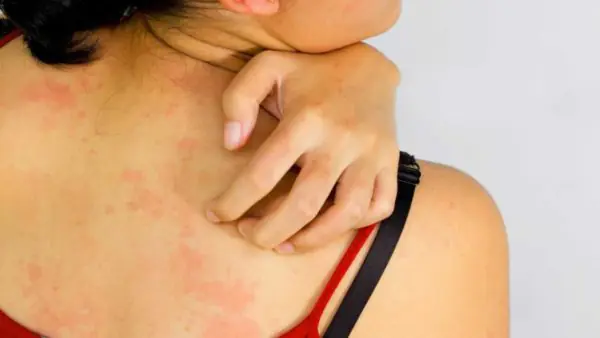
Provoking factors for redness and itching of the skin. Allergy
Skin allergies occur when the body comes into contact with a foreign object. Often allergens are:
- cosmetics;
- animal hair;
- dust;
- products;
- household chemicals;
- synthetic clothing;
- bite of a mosquito or other insect.
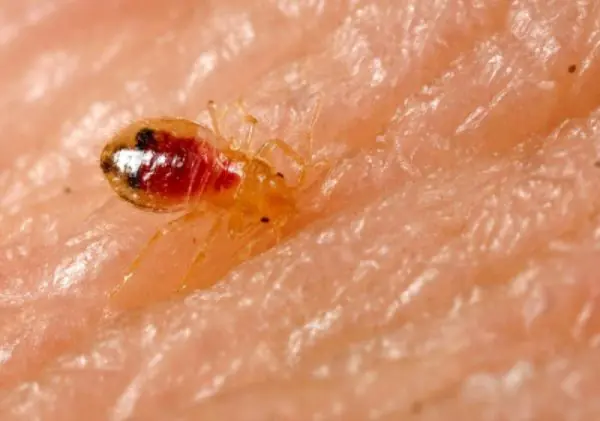
During an allergy, the epidermis may turn red and become covered with small pimples. Later, the affected area begins to itch. In this case, you should definitely consult a doctor to immediately understand what specific substance you are allergic to. It is also recommended to use medications and ointments that stop the body's reaction.
Sometimes women complain that after using new cosmetics they develop red spots and rashes on their bodies. The reason for this may be:
For this reason, instead of the desired results from cosmetics and expensive ointments, a person may end up with skin problems. That is why you need to carefully read the instructions for the products you purchase so as not to harm your health.
If your feet are very itchy, this is an indicator of many diseases. You should pay attention to symptoms that have appeared recently. The reason for this may be simple rubbing with clothing and even the development of varicose veins. Any itching should not be ignored.
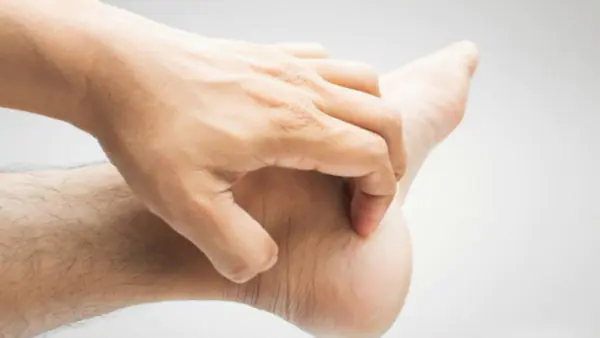
Food allergies
An allergy can occur as a result of an allergen entering the body. After this, histamine is released. This compound is activated in the body during allergic reactions.
Food allergies are often associated with a certain type of food: eggs, sweets, honey. Sometimes the body rejects substances found in certain medications (antibiotics). During flowering plants, an allergic reaction may occur to their pollen.
If a person has a food allergy, which is accompanied by vomiting, nausea or high fever, then he needs to take anti-inflammatory and anti-allergenic drugs. Some of the effective ointments are Mesoderm and Beloderm. Doctors often prescribe Suprastin and Tavegil tablets to patients.
Contact allergy
Contact allergies appear on the body in the form of red spots that occupy large areas. The inflamed area may be very itchy. If cosmetics act as irritation, the affected area becomes covered with a small rash. Often allergies go away on their own if the irritating substance is removed from the body.

Many people experience swelling when stung by bees. The bite site not only hurts, but also itches very much. It may also swell and spread redness to nearby areas of the skin. To relieve symptoms, specialists prescribe ointments and medications. Applying cold to the affected area is a great way to quickly relieve pain.
Allergies can manifest themselves on the skin in response to the mechanical impact of various objects:
- shoes or tight clothing;
- elastic bands or belts;
- bracelets.
After eliminating the irritant, redness and itching occur on the skin. Sometimes blisters may appear. After a while, the irritation goes away on its own without any treatment.
Stress as a cause of itchy skin
The skin on the face may become covered with red spots due to extreme anxiety. If a person often worries, itching occurs in different parts of the body. A rash may be added as accompanying reactions. These symptoms can be treated with physical therapy, soothing baths and creams. If necessary, patients are recommended to undergo psychotherapy.
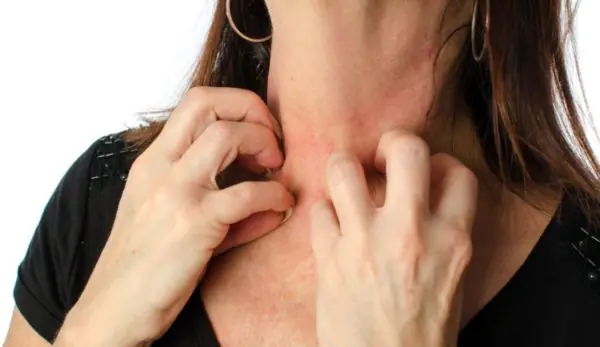
If itching and burning do not go away on their own for a long time, then patients should seek help from a dermatologist to find out the main causes of the disease. Sometimes irritations can be the cause of serious pathologies that need to be treated promptly.
What diseases cause the skin to become red and itchy?
Redness and itching can appear due to many diseases, including chicken pox, scarlet fever, psoriasis, diabetes, urticaria, lichen, neurodermatitis, diathesis and other diseases.
- Chickenpox is characterized by the appearance of many rashes on the skin, severe itching and fever. The causative agent of the disease is herpesvirus type 3, which can easily be transmitted through contact between people. Before the bubbles form on the body and after they spontaneously burst, red spots appear on the skin. They can be flat or protrude slightly above the surface. The rash spreads throughout the body and can include up to 50 lesions.
- Scarlet fever is an infectious disease caused by streptococcus. It can easily be transmitted through personal contact. The development of pathology occurs acutely. In the first hours of infection, the patient may feel symptoms that resemble a sore throat. After 12 hours, a rash may appear on the body and face. Red spots itch, and body temperature rises to 39 degrees.
- Psoriasis often occurs in people after severe emotional shock. It covers a large area of skin with spots and scales that may be brown or red in color. You can’t joke with such a disease; it needs to be treated urgently, because it is impossible to completely get rid of psoriasis.
- Diabetes often leads to dehydration, which can cause the skin to peel. People suffering from this disease often experience fungal infections, which can lead to cracks in the body.
- Hives also cause itching and redness on the skin. The symptoms of this disease correspond to the name of the disease. A person may notice irritation on his skin, which often occurs after touching nettles. Sometimes blisters appear on the body, which are very itchy.
- Ringworm is pink in color, so people often have the misconception that the skin is chapped or hypothermic. In this case, patients must pay attention to other symptoms such as fever and itching at the site of redness. Over time, the lichen will be located not only on top of the skin, but will protrude slightly above it. This formation on the body goes away on its own, only it needs to be treated with iodine. If the itching cannot be tolerated, you can use special ointments that help eliminate it.
- Neurodermatitis causes severe itching on the skin. This often occurs where the skin comes into contact with rings or watches.
- Diathesis often occurs in children who are breastfed. Red spots can first be noticed on the cheeks, after which they spread to the neck, arms and groin area. Diathesis spots often itch if the skin in the affected areas is dry. If treatment is not carried out, weeping spots appear on the body. Diathesis in children occurs due to fruits, juices and new complementary foods.
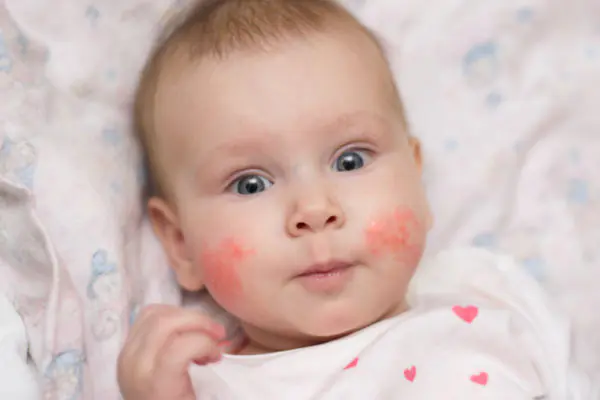
Differential diagnosis
Only specialists can determine the origin of temporary and persistent spots on the skin. Patients must first come to an appointment with a dermatologist, who will require you to undergo the necessary examinations and consult with other doctors. The selection of a suitable list of drugs should be carried out only after diagnosis.
If red spots appear on the skin, patients should:
- Consult an allergist. Using special tests, you can determine the type of allergen.
- Submit a scraping from the stain that appears. This analysis must be performed to rule out scabies and fungal infection.
- Take a blood test to determine if there are inflammatory reactions in the body.
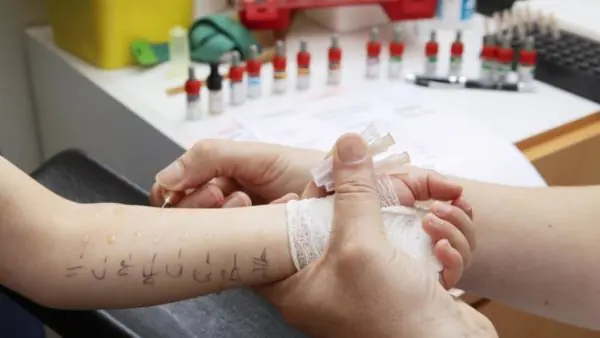
Depending on the cause of the disease, doctors select the appropriate treatment.
How to deal with itching at home?
First of all, you should try not to scratch the area of redness. You can relieve itching with a light massage. Venotonic also helps eliminate irritation from the legs.
If patients are allergic to medications, the doctor will prescribe antihistamines. If the patient has a reaction to other components, contact with them must be stopped. Reddened skin should be washed with water and lubricated with moisturizer with vitamins A and E.
The skin itches and flakes often due to dryness. If you scratch the redness until it bleeds, the affected area should be rinsed with water and disinfected with hydrogen peroxide. Most doctors recommend that patients use Guardian balm, which quickly relieves inflammation and itching. It can be used even for children every 2 hours.
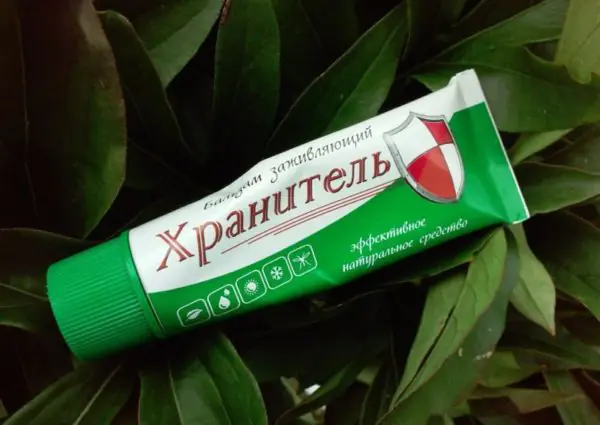
Pharmacy remedies for itching and redness of the skin
Complex drug treatment includes drugs from different groups that can effectively get rid of an allergic reaction.
Antihistamines
Allergy treatment is aimed at eliminating contact with the allergen and taking antihistamines in the form of the following medications: Loratadine, Ebastine and Cetirizine.
Antifungal agents
Fungal diseases take a long time to treat, and are often accompanied by relapses. Therefore, you cannot choose an antifungal agent for yourself. Patients can effectively cure the disease after identifying the pathogen and selecting an external or internal antifungal drug. Treatment with such medications is 2-6 weeks and 14 days to prevent relapse. To eliminate the fungus, doctors recommend the following drugs: Lamisil and Nizoral.
Sedative medications
Sedative medications are often used to reduce skin itching. For these purposes, the doctor often prescribes Glycine, Trioxazine and Amizil.
Traditional medicine recipes
Before consulting a doctor, it is better for patients not to take medications on their own, as they can worsen their health. You should also refrain from scratching the skin, as the wound may become infected. Irritated areas of the body can easily be soothed by herbal decoctions - string, chamomile and calendula. Compresses can be made from these plants. A soda solution helps relieve itching after insect bites.
You should not apply medications that contain alcohol to your skin, as they can increase itching and flaking. At night, doctors recommend Suprastin. To reduce itching, you should use Diphenhydramine. You can calm your nerves with a decoction of motherwort and valerian root. Further treatment is possible only after consulting a doctor.
Human skin is systematically exposed to various factors. But its appearance can also be affected by diseases of the internal organs, so doctors consider the skin to be a detector of the body’s condition. We will devote this material to the topic of itching, as well as peeling of the skin. We will find out the reasons for such a depressing phenomenon and study ways to eliminate the factors that provoked discomfort.
What are the known types of itching?
Researchers were able to prove that itching occurs due to the fact that blood circulation in the epidermis increases. As a result, the person begins to actively scratch the area that bothers him, causing the skin to become noticeably inflamed. Itchy skin is usually classified into:
- localized, when one place itches (for example, the anus, perineal area, arms or legs);
- generalized, when the skin of the whole body itches (in this case, redness of the skin may not appear at all).
Itching can occur either permanently or temporarily. Constantly disturbing itching can cause numerous disturbances in the functioning of organs and systems. First, sleep may be disturbed, then appetite may disappear and nervous excitability may appear.
What diseases can cause itching?
Itching can be caused by:
- Tract dyskinesia, excreting bile or liver disease. Problems in the functioning of these organs provoke excessive release of bilirubin, as well as cholic acids, which settle in the epidermis.
- Overpriced sugar level in the blood sometimes manifests itself as body itching.
- Xerosiswhen the skin suffers from excessive dryness. This disease occurs due to the abuse of cosmetics. Hormonal imbalance can also provoke xerosis.
- Psoriasis. This disease is characterized by the appearance of flaky plaques on the elbows, neck, head, and limbs, which itch and cause discomfort.
- Scabies. This disease is characterized by its contagiousness. It is caused by the scabies mite.
- Contact dermatitis. This disease is characterized by a rash that has specific boundaries. Contact dermatitis often manifests as blistering rashes.
- Atopic dermatitis. This problem usually affects children. It is not difficult to recognize the described illness: the baby may experience peeling, dryness of the cheeks and their redness. In very small babies, diaper rash in the skin folds can persist for a long time.
- Neurodermatitis. This type of itching occurs when a person has a malfunction of the nervous and immune systems.
Experience suggests that itching is most often caused by allergies. Allergies are not always triggered by ingested foods. Often itching appears after human skin has come into contact with chemicals (including cosmetics) or poisons. The use of certain medications can also cause allergies. In some cases, itching can be caused by insect venom entering the body as a result of its bite.
Since it is difficult to independently determine the cause of redness on the skin, burning and tingling, you should rush to see a specialist of a certain medical profile (dermatologist or allergist).
Diagnostics
Important! Before visiting a dermatologist, you should not use any medications and resort to proven methods of traditional medicine to eliminate itching. This factor may interfere with making a correct diagnosis.
The dermatologist will conduct an in-depth examination to find out what skin disease has appeared on the body. In situations where the patient knows for sure that the cause of the itching lies in allergies, it is worth immediately contacting an allergist.
The diagnostic process is carried out according to the following scheme:
- The doctor examines areas of the body that are causing discomfort.
- Information about the patient’s well-being is collected.
- Laboratory tests are being carried out.
Each patient is examined individually. As a rule, blood, urine, and feces are carefully examined for various indicators. The examination may also require x-rays, ultrasound and endoscopy. Sometimes the patient is prescribed an oncometer test.
The result of such an examination will be the identification of diseased organs that provoke irritation on the skin.
Treatment methods
Itching, accompanied by redness and burning, will require special attention in terms of body care. Doctors recommend wiping itchy spots that appear in many places with a pre-prepared vinegar solution. If itching occurs in the perineum or in the anus, you will need to wash the affected areas in the morning and evening. Treatment of itching can be carried out medicinally or using various traditional medicines.
Drug therapy
Ointments for the treatment of itching can be used as an addition to the main therapy. They will help quickly remove skin diseases, itching of the skin, peeling and redness of the body.
The following are used as ointments:
- Levomekol. It has a well-defined anti-inflammatory effect. But it is contraindicated in the presence of burns and ulcers.
- Fenistil gel. Apply to sore skin several times a day. Its negative side is drying of the skin. If adverse reactions occur, you should stop using the drug.
- Sinaflan. The affected areas are lubricated with this cream up to 4 times a day. Long-term use can lead to severe hair loss or skin pigmentation.
Attention! The use of any ointment should begin with studying the instructions for its use.
As a rule, the presence of itching is a consequence of excess histamines. Therefore, doctors in such cases prescribe various antihistamines. This:
- Suprastin. The dose is selected taking into account the patient's age and weight. Negative side effects are rare. However, there are restrictions on admission.
- Erius. This product always demonstrates high efficiency. But it is not prescribed to pregnant or breastfeeding mothers. In addition, Erius implies a number of side effects.
- Tavegil. The drug is prescribed to children from 6 years of age, ½ tablet. Adolescents who have reached the age of 12 should take 1 mg of the drug in the morning and evening.
- Claritin. Effectively removes itching within 7 days of use. Take 1 tablet (10 mg) once a day.
Ointments containing glucocorticosteroids can demonstrate an effective effect. They are contained in such drugs as:
- Triderm (quick anti-inflammatory effect, rapid elimination of irritation and itching);
- Fluorocort (has certain contraindications and side effects, prescribed with caution);
- Lorinden (has a side reaction, use is allowed for 2 weeks).
The listed steroid drugs can only be prescribed by a doctor, since if they are used incorrectly, they may make you feel worse.
ethnoscience
Traditional methods of treating itching and allergic manifestations provide different ways to combat discomfort:
- Inflammation can be relieved by a cream with glycerin or an anti-inflammatory cream containing chamomile extract.
- Itching from an insect bite is relieved by wetting the inflamed area with alcohol.
- Itching can be relieved by applying a mixture of baking soda, water and baby cream.
- Irritation with redness is relieved by a mixture made from menthol and tea tree oil.
- A bath with soda and salt relieves itching.
- Itching and irritation are relieved by applying a paste of pumpkin seeds to the problem area.
- Rubbing the affected areas with olive oil after a shower relieves irritation.
Important! Nutrition is an important factor. For any skin rashes, itching, or severe redness, you should exclude spicy, heavy foods, as well as foods with dyes and GMOs.
If you have skin problems, don't put off taking care of your health until later. Hurry to a highly specialized doctor, who, based on the test results, will announce a diagnosis and prescribe a range of effective medications.



